School officials reported on Saturday that as part of the NCAA’s penalties for recruiting violations, Tennessee football program, under former coach Jeremy Pruitt, will forfeit all 11 wins from the 2019 and 2020 seasons.
While Tennessee managed to avoid a postseason ban, the NCAA imposed a hefty $8 million fine on the program, believed to be the largest in NCAA infractions history. Additionally, the university will serve a five-year probation period and endure a complete reduction of 28 scholarships. The NCAA determined that 16 players were ineligible during the 2019 and 2020 games due to their involvement in over 200 infractions committed during Pruitt’s tenure from 2018 to 2020.
As a result, Tennessee’s official record book will be adjusted, indicating that they went 0-5 in 2019 and 0-7 in 2020. Pruitt’s final record at Tennessee will be amended to 5-19.
It’s important to note that vacating wins does not automatically award victories to the opponents in those games. With these penalties, Tennessee’s overall record now stands at 856-410-53, causing them to fall out of the top 10 nationally in terms of wins.
Tennessee Football in Big Trouble!
The committee on infractions convened in Cincinnati for two days in April to hear Tennessee’s case, with university officials, SEC commissioner Greg Sankey, and Pruitt present. The case originated from a credible tip received by university chancellor Donde Plowman in November 2020, regarding a potential recruiting violation within the football program. In response, Tennessee hired the law firm Bond, Schoeneck & King to conduct an extensive investigation, lasting nearly a year and incurring over $1.5 million in legal fees.
Sources informed ESPN that during the Cincinnati hearings, Pruitt appealed to the committee on infractions, requesting that the current Tennessee players not be penalized with a postseason ban and asserting their right to compete for championships.
Tennessee officials were determined to avoid a postseason ban from the outset, aiming to protect the players and coaches who were not involved in the violations. The absence of a bowl ban aligns with a recent trend observed in NCAA cases.
“I have said from the beginning that we are committed to winning with integrity,” Plowman said in a statement Friday. “I believe we also resolved this case with integrity, always committed to holding ourselves accountable and wrong-doers responsible, while protecting the rights of student-athletes who had nothing to do with the infractions.
“We recognize this was a serious case, and the penalties we received from the Committee on Infractions are consistent with what we expected and negotiated with the NCAA enforcement staff last year.”
Also Read: Ranking the Best and Worst NFL Free Agency Signings in 2023
